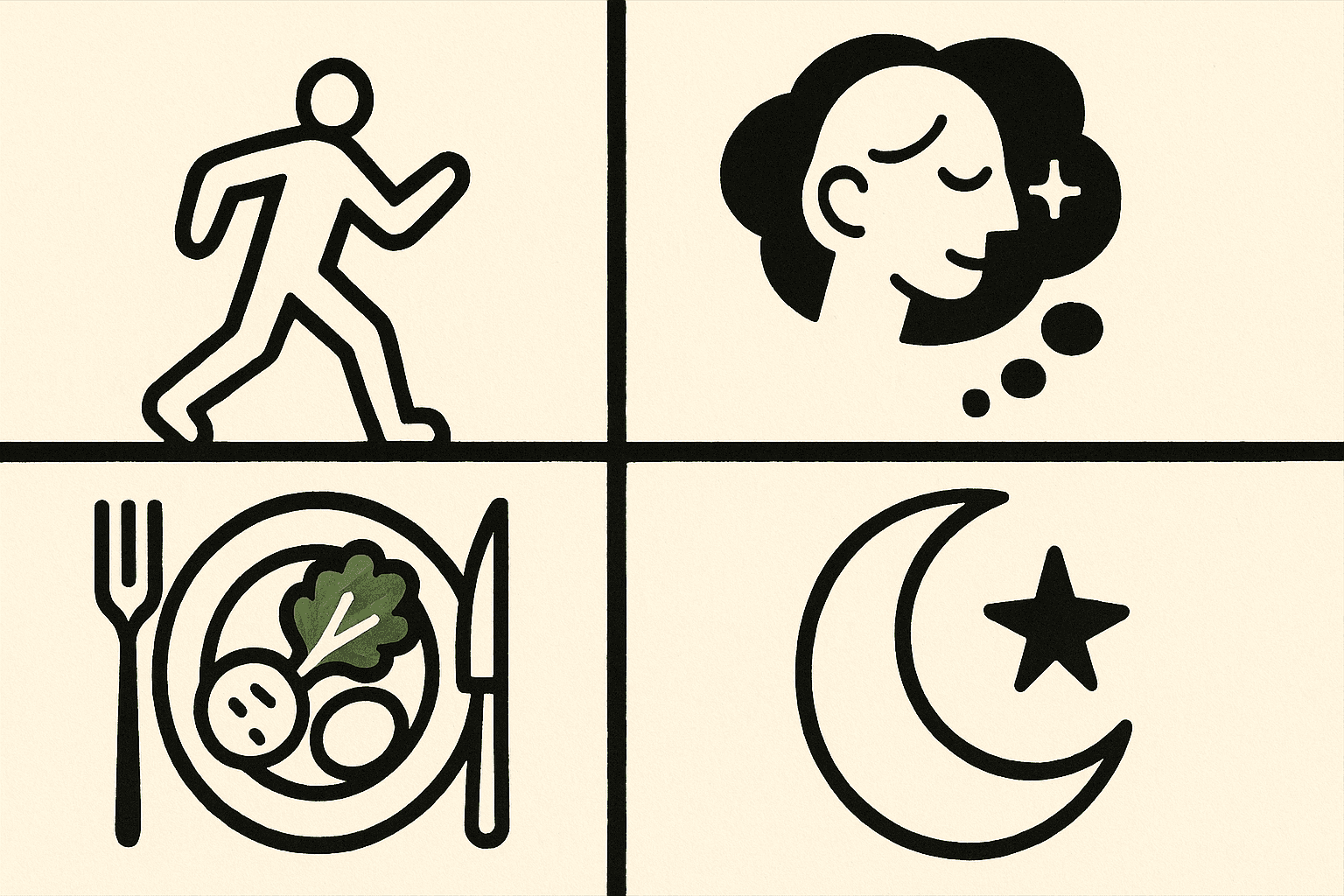More Than Food: How a Healthy Lifestyle Starts with Your Fork—and Extends to Your Entire Life
Published on June 13, 2025

Why Food Is the Starting Point of a Truly Healthy Life
We’ve all heard it: Eat clean. Move more. Sleep well. But what does a genuinely healthy lifestyle look like beyond the Pinterest boards? It begins with food — and expands to movement, sleep, and mindset. Each bite sends messages to your brain, gut, and immune system. Let’s connect the dots and build a system that nourishes every part of you.
The Foundation: Nutrition as Your Life Engine
Start with your fork, not your fitness tracker.
Eat mostly whole foods: vegetables, fruits, legumes, whole grains, lean protein, healthy fats
Get 25–35g of fiber daily for gut, heart, and hormone balance
Build every plate with protein, complex carbs, and healthy fats
Avoid ultra-processed foods, industrial oils, artificial sweeteners
Hydrate intentionally and consistently
Value nutrients over calories
Cook at home 80% of the time — for better quality, control, and consciousness
Eat earlier in the day; stop eating 2–3 hours before bed to enhance digestion and sleep
MOVE: Not Just Exercise — Daily Activation
You don’t need a gym. You need momentum.
Walk 7,000–10,000 steps per day
Sprinkle in “movement snacks” — 2 minutes every hour
Include 2–3 resistance sessions weekly
Stretch, squat, boogie — play counts
Focus on posture and daily flow
Move more than you sit, and sweat most days
Start simple: walk after meals to support blood sugar
Movement boosts mood, metabolism, sleep, and self-trust
Sleep: The Overlooked Powerhouse
Great food and workouts mean little without sleep.
Stick to a regular sleep-wake cycle (even weekends)
Avoid screens 1–2 hours before bed
Keep your bedroom cool, dark, and quiet
Reduce caffeine and avoid big meals at night
Try relaxing rituals: journaling, stretching, tea, music
Catch morning sunlight to anchor your rhythms
One bad night spikes ghrelin, lowers willpower, and increases cravings
Sleep is brain nutrition and recovery fuel — not laziness
Mindset and Stress: The Invisible Drivers of Health
Mindset impacts digestion, glucose, cravings, and immune health.
Practice 2 minutes of daily meditation
Use breathwork to ground your nervous system
Seek light and nature exposure
Connect with supportive people
Reframe setbacks as learning
Ditch all-or-nothing — embrace “better than yesterday”
Limit toxic inputs — media, noise, chaos
Track your triggers and your triumphs
Celebrate small wins to build momentum and resilience
Lifestyle in Action: What a Day Might Look Like
Morning
Wake up + sunlight + big glass of water
Protein-packed breakfast: eggs, spinach, avocado
10-minute stroll or movement
1–2 lines of gratitude or intention
Midday
Lunch: quinoa, chicken, kale, olive oil
Quick walk + 5-min breathwork
Hydrate and realign posture
Afternoon
Smart snack: Greek yogurt + berries
Yoga or strength training
Screen break + 2-min dance burst
Evening
Dinner: salmon, roasted veg, brown rice
Stretching, herbal tea, screen-free wind-down
Reflection: What’s one thing to support tomorrow?
Lights out by 10:30 p.m.
This is not a checklist — it’s a rhythm. Flexible, scalable, human.
Final Thoughts: Small Is Powerful
You don’t need to be perfect. You need to be consistent.
Start small.
Swap soda for water
Add a veggie to lunch
Walk after dinner
Go to bed 30 minutes earlier
These changes stack up. They build a body that is stronger, happier, and more resilient.
Healthy people aren’t flawless — they’re flexible.
They reset. They adapt. They keep showing up.
Choose habits that feel like self-respect, not self-punishment.
Build rituals that feel like love, not discipline.
And always remember: your healthiest life starts with food — but doesn’t end there.
Fuel your body. Protect your energy. And create a life that feeds you — every single day.








